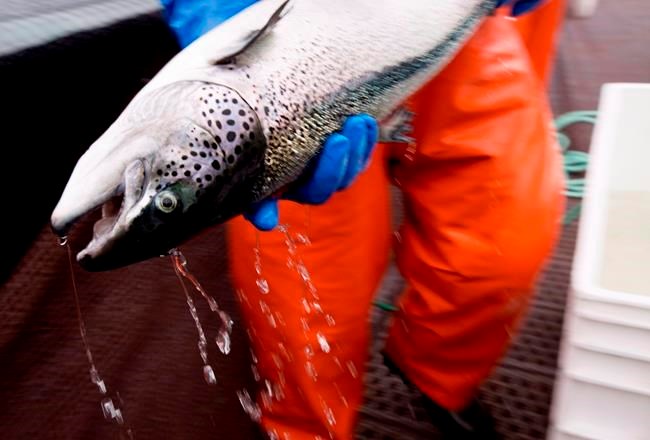VICTORIA — Hundreds of thousands of wild fish have died at British Columbia salmon farms in recent years, with an operator blaming the kills on the "learning curve" associated with new machinery to remove sea lice from stock.
A salmon conservation group says the wild fish, primarily herring, died needlessly.
Federal Fisheries and Oceans Canada data shows more than 817,000 wild fish were killed at B.C. salmon farms in 2022, five times the number of deaths reported in previous years, Stan Proboszcz, a senior scientist at Watershed Watch Salmon Society, said Tuesday.
Much of the blame likely lay with a high-pressure spraying process farm operators are using to clear lice and other parasites off farmed salmon, he said.
"We're seeing an unprecedented spike in how many wild fish are being caught and killed by salmon farm operations," Proboszcz said in an interview. "We saw a huge spike in 2021-22, particularly of herring."
Fish farm operator Cermaq Canada said in a statement that two factors were behind a rise in wild fish deaths in 2022, including "the learning curve of implementing new technology to manage sea lice levels."
Cermaq also said 2022 was an unprecedented year for herring numbers "due to an extremely large 2021 spawning biomass" on the west coast of Vancouver Island.
The company said herring "seek refuge in salmon farm infrastructure and can become trapped in smolt nets, which have a much smaller mesh size."
Cermaq said Fisheries and Oceans Canada data showed herring deaths at the salmon farms were estimated to amount to 0.08 per cent of the total amount of Pacific herring mass last year.
Recent mitigation efforts have resulted in an almost 95 per cent reduction in herring deaths so far this year at salmon farms, the company said.
Cermaq said it reported the herring deaths to DFO and the Ahousaht First Nation, with which the company has a protocol agreement to operate a fish farm in waters near Tofino on Vancouver Island's west coast.
"This incident was a new challenge brought on by a significant shift in innovative technology, the use of mechanical delousing to manage sea lice on our farms," said Cermaq. "During the hydrolicer treatments in 2022 we experienced unusually high numbers of incidental catch in nets and struggled to manage the sheer number of herring, which in fact reflected the generally large numbers in the area."
Proboszcz said the procedure to clear lice off farmed salmon results in herring and other wild fish trapped in the net pens being sucked out of the water and sprayed out, causing their deaths.
"They are inadvertently sucking up herring that are in the farms as well, it appears, and killing them en masse," he said.
Proboszcz said the deaths remain a concern because herring are a key species, whose numbers face declines in many coastal waters.
"Herring are very important because they are a foundational part of the marine food web," he said. "They provide food for a whole host of different species of fish, birds and mammals, including chinook salmon which we're seeing declining in a number of regions."
Fisheries and Oceans Canada said in an email that it implemented new conditions of licence in March to prevent such deaths from happening again.
The department said it is also requiring "earlier and more frequent" reporting from industry if they encounter wild fish during sea lice treatments.
Open-net fish farms off B.C.'s coast are a long-running subject of debate, with opponents saying they are linked to the transfer of disease to wild salmon, while supporters say thousands of jobs will be threatened if the operations are phased out.
The federal government committed to a plan to transition salmon farms from B.C. waters by 2025, but it announced an extension of a consultation period last June.
Earlier this year, the federal government announced it would not renew licences for 15 open-net Atlantic salmon farms around B.C.'s Discovery Islands near Campbell River on Vancouver Island.
This report by The Canadian Press was first published Dec. 5, 2023.
Dirk Meissner, The Canadian Press




